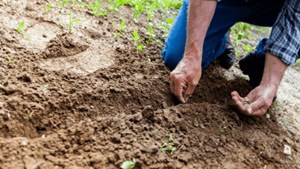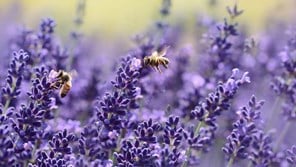How gardening can improve your wellbeing
6 minute read

No matter what age you are, it can be hugely rewarding to make the most of any outdoor space you have. After all, nature can have a positive effect on wellbeing. In this guide, ecologist and outdoor enthusiast, Michael Hollard, explains how you can enjoy these benefits if you have a garden, even if you’ve never picked up a trowel before.

Independent Living Solutions
Home mobility aids, wearable alarms and personal care products to help you live independently, stay safe and feel confident.
For expert knowledge on all things garden-related, Age Co has teamed up with ecologist, author and nature educator Michael Holland FLS. Michael has taught thousands of people all about plants.
Whether you want to create a low maintenance garden or introduce an array of plants to stimulate your senses, hopefully, the questions Age Co has put to Michael will give you a kick-start.
Q: In your opinion, what are the benefits of the outdoors and gardening for your mental health and overall wellbeing?
“Without a doubt, gardening and being outdoors are not just good for us physically, but benefit our mental wellbeing too. As an ecologist and wildlife gardener, I believe that understanding and appreciating the natural world around us (locally, nationally and globally) is very important and can give us a sense of being part of nature ourselves, which we are - whether it's knowing where our food comes from, recognising bird songs in our parks and gardens, identifying bees and butterflies visiting flowers, understanding the weather or noticing the changing seasons.
“There is plenty of research supporting these benefits for people of all ages and walks of life, including a report from the King's Fund (Gardens and health: implications for policy and practice). According to the horticultural therapy charity High Ground, gardening activities can help to boost your quality of sleep, dexterity, balance, stamina, hand-eye coordination, sensory awareness, upper body strength and patience.”
Q: Are there any plants you could introduce into your garden that can help stimulate the senses and boost overall mood?
“The obvious starting point is the visual side of things - considering plants of different colours, hues, tones, textures, shapes and sizes. My personal preferences are:
- Nigella (aka Love-in-a-mist)
- Borage
- Nasturtiums
- Teasel
- Opium Poppy
- Swiss Chard
- Evening Primrose
- Honesty
- Comfrey
- Quaking Grass (Briza media)
- Cardoon
- Fuchsia
- Jasmine (winter and summer flowering species)
“You can also plant cooking herbs and an assortment of flowering bulbs - giving almost all year round colour. Many of these are all very attractive to pollinating insects and give me that added bonus of the joy of wildlife watching from the comfort of a garden chair in the knowledge that I have helped nature by choosing those plants.
“When it comes to other senses, I would suggest plants that make a sound as the wind blows through them - anything from shrubs to bamboos can be good for this. When choosing bamboo, a clump-forming species is recommended as the spreaders do just that and might take over the neighbourhood!

“For scent, I would recommend very common Mediterranean culinary herbs, such as:
- Thyme
- Lavender
- Rosemary
- Mints
- Lemon Balm
- Oregano
You could also consider Roses and Jasmine, which are all relatively easy to grow, maintain and use. Smell is one of the senses that can almost make us time travel back to a place, event, a special person in our lives - so again, your choice here would depend on this.
“When it comes to flavours - there is a whole world of herbs, spices, vegetables and fruits to grow. Some are admittedly easier than others, but you can't go too far wrong with raspberries, tomatoes, courgettes and rhubarb - all giving great flavour when fresh.
“From the point of view of how a plant feels to the touch - again there is a wealth of choice here, from the soft and fluffy Lamb's Ears (Stachys), soft leaves and flowers of Lavender and Curry plant (Helichrysum), the bobbly flower heads of Cotton Lavender (Santolina) and Alliums, smooth and long leaves of the New Zealand Flax (Phormium) and of course there's that wonderful feeling cool lawn grass underfoot on a warm day.”
Q: Are there any garden plants that can be brought indoors to help boost your overall mood or used for another purpose?
“The majority of garden plants wouldn’t be suited to the temperatures in the average home, but there are ways of bringing the outside in. With a bit of careful planning, you could have home-grown cut flowers in and around your house every day of the year to brighten things up (sight and smell).
“A few years ago, Rachel Petheram of Catkin Flowers ran a workshop at my former workplace, Chelsea Physic Garden all about this exact subject - cut flowers every day.
“I use all sorts of plants from my own garden, including: Elderberry vinegar as a common cold zapper; assorted herbs and garlic and chillies to make a tangy and healthy herb vinegar for salads; Chamomile and Calendula flowers to add to vinegar as a hair shining conditioner; sage leaves to produce beautiful leaf print bookmarks with ink; and of course an assortment of vegetables and fruits for tasty home-grown foods.”
Q: Do you believe that growing your own veg can have a positive impact on your wellbeing?
“Without a doubt. From my experience, growing my own vegetables brings me joy throughout the whole year. From the focus and precision of carefully making my newspaper pots and sowing seed in them, the anticipation of waiting for germination, watching the seedlings grow and making sure they have all they need to make it to planting out into the soil (nourished by the homemade compost that has been turned and stirred for months), and then the joys of mollusc management once they are in the ground.
“Finally, the joy of harvesting, preparing and eating the perpetual spinach, tomatoes, beans, peas, artichokes in the lovely knowledge that “I grew this”. Most of this process is time spent outdoors getting lots of exercise and fresh air rewarded by the freshest healthiest food one could ever eat - with zero air miles and a matter of footsteps from plot to plate.”
Q: What would be your best advice to anyone wanting to make the most of their garden over the coming months?
“If you are new to gardening, start small and try a few things out to begin with. Don’t rush into it - patience is a virtue. If you are in any doubt about what to do - there is plenty of information online with tips and tricks and suggestions about what and when to plant, how to nurture and what has gone wrong, because we all make mistakes and have cherished plants that die.
“There are plenty of online groups about gardening tips and tricks and some of them are likely to be local ones for swapping seeds, produce and ideas as well. My new book, I Ate Sunshine for Breakfast is full of hints, tips and ideas for the whole family.”
For more guides, advice and information on making the most out of later life, take a look at Age Co’s Useful Article section.

Sign up to the Age Co Newsletter
Each month, our email newsletter delivers inspiring stories, practical guides to later life, plus the latest news about Age Co and the charitable work we support.
